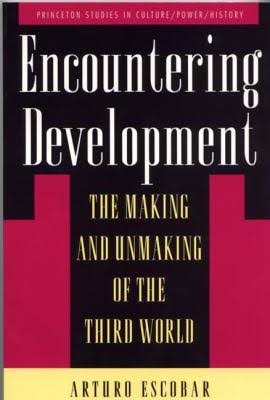Encountering Development
One of the books commonly cited and recommended in critical development studies circles is Arturo Escobar's Encountering Development: The Making and Unmaking of the Third World (1995). Escobar is a Colombian-American Anthropologist, who interestingly started his academic career in chemical engineering. The award-winning book is typically summarized as reframing 'development' as a tool of control akin to colonialism. As a central idea, however, this was not entirely new: Amin (1976) has waged critiques of this nature, Weber (1976) had done similarly with the history of France, not to mention Scott (1985), Mintz (1985) and Ferguson (1990). The strength of this book, I believe, was not its originality but its bringing together of ideas.
Escobar begins by explaining that Encountering Development "tells the story of this dream and how it progressively turned into a nightmare. For instead of the kingdom of abundance promised by theorists and politicians in the 1950s, the discourse and strategy of development produced its opposite: massive underdevelopment and impoverishment, untold exploitation and oppression. The debt crisis, the Sahelian famine, increasing poverty, malnutrition and violence are only the most pathetic signs of the failure of forty years of development. In this way, this book can be read as a history of the loss of an illusion" (p. 4). Recognizing the book was written in the 1990s, it is interesting to contrast the framing of development presented by Escobar and that of Kenny in his 2011 book Getting Better – not to be contrasted here, but a worthwhile comparison for students of development studies.
"To understand development as a discourse, one must look not at the elements themselves but at the system of relations established among them. It is this system that allows the systematic creation of objects, concepts, and strategies; it determines what can be thought and said. These relations – established between institutions, socioeconomic processes, forms of knowledge, technological factors, and so on – define the conditions under which objects, concepts, theories, and strategies can be incorporated into the discourse. In sum, the system of relations establishes a discursive practice that sets the rules of the game: who can speak, from what points of view, with what authority, and according to what criteria of expertise; it sets the rules that must be followed for this for that problem, theory, or object to emerge and be named, analyzed, and eventually transformed into a policy or a plan." (p. 40-41)
While critiquing the defining of development, Escobar also offers his own definitions, ones that also disfranchises those who experience poverty from contributing their voice. For example, Escobar has a rather romantic vision of life before or outside of market influence (also assuming that all people before capitalism did not engage in market trade), in saying: "it is true that massive poverty in the modern sense appeared only when the spread of the market economy broke down community ties and deprived millions of people from access to land, water, and other resources. With the consolidation of capitalism, systemic pauperization became inevitable" (p. 22). This vision neglect social differentiation within communities, and also the serious challenges faced. This includes, for example, the poverty associated with enslavement and of famine, long pre-dating capitalism. Using Escobar's approach, it ought to be people themselves that define poverty, for their local circumstances, which we unfortunately do not find, and thus some of the critiques Escobar makes of others, also apply to his book (e.g. speaking about and for others).
As with all books, many of the concerns raised within them are time specific. Rather than focus on those that have changed, consider one that all development students, practitioners and academics can reflect on: "The underlying premise of this investigation is that as long as institutions and professionals are successfully reproducing themselves materially, culturally, and ideologically, certain relations of domination will prevail; and to the extent that this is the case, development will continue to be greatly conceptualized by those in power" (p. 106).
On accountability: "If 'the bank' does not have clear answers, nobody else does. Being 'the bank,' however, it can take some risks, and if 'some of the experiments fail,' they will bow to the difficulties of life (in the Third World) and humbly start all over again. Quite a comfortable position, especially if we consider that it is not they who have to suffer the consequences of failure, because the loans are paid back by Third World people" (p. 160-161).

